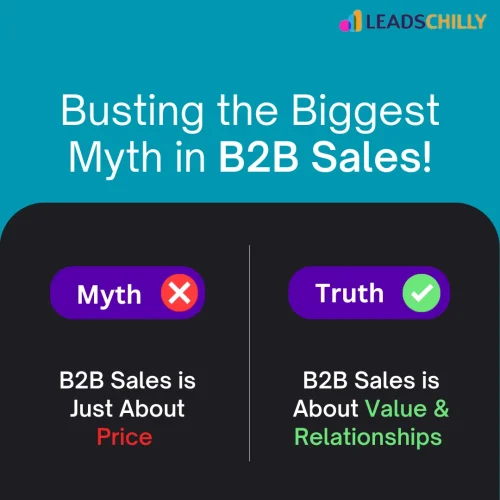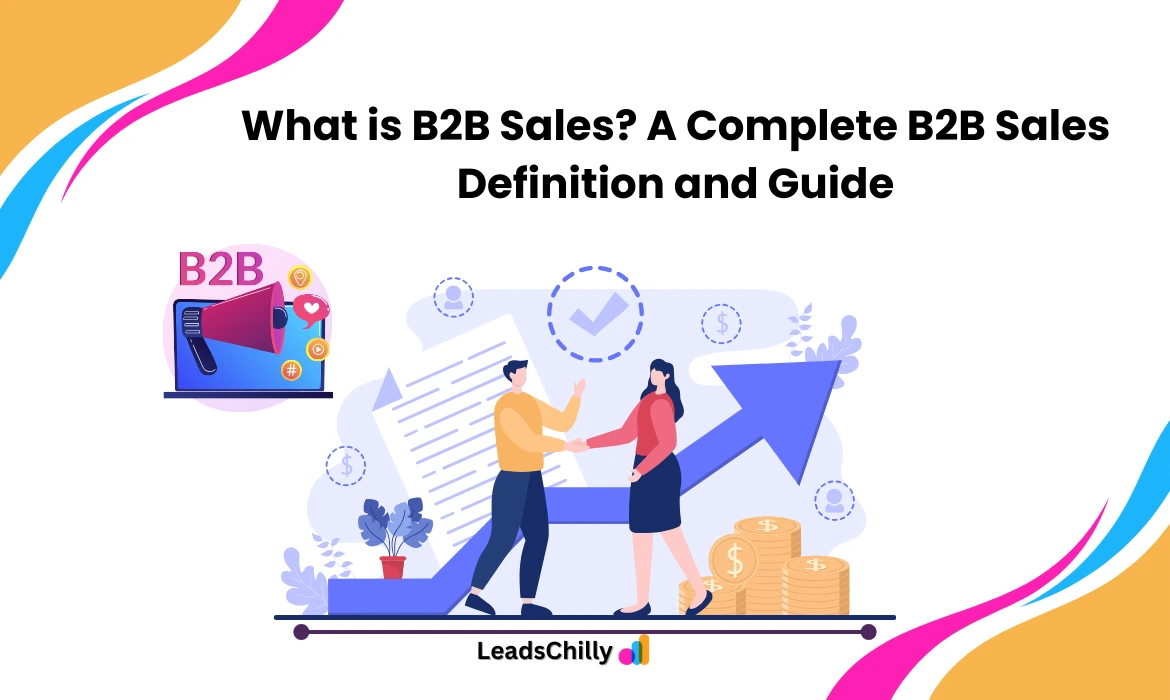In simple terms, B2B sales, or B2B Sales Definition refers to the process where one business sells products or services to another business. This type of sales, unlike B2C Sales (Business-to-Consumer), involves more complex deal structures, longer sales cycles, and higher value transactions. B2B sales require building long-term relationships and delivering continuous value to business clients.
In 2024, B2B eCommerce is expected to grow rapidly, with the U.S. alone projected to reach $1.8 trillion in B2B sales, accounting for 17% of total B2B transactions. This surge reflects how vital B2B sales are to businesses of all sizes.
Ready to streamline your B2B sales process and attract high-quality leads? Sign up for LeadsChilly’s free 14-day trial today to supercharge your sales efforts and accelerate your business growth.
Understanding the Basics of B2B Sales
At its core, B2B sales is all about one company selling to another. This could be for products, services, or solutions that help the buying company operate more efficiently. The B2B sales process is characterized by multiple decision-makers, larger transactions, and often long-term relationships that focus on continuous value exchange.
What is the Definition of B2B Sales?
B2B sales refers to the process where businesses sell goods or services to other businesses. The B2B sales definition often involves complex deal structures, multiple meetings, and negotiations. These transactions are usually designed to meet specific business needs, such as improving efficiency, reducing costs, or enhancing revenue streams.
How is B2B Sales Different from B2C Sales?
While B2C sales (Business-to-Consumer) deals with selling products directly to consumers, B2B sales focus on business clients. Here’s a quick comparison:
- B2C Sales: Involves simpler products, shorter sales cycles, and individual consumers.
- B2B Sales: Features longer sales cycles, higher value deals, and decisions made by committees or multiple stakeholders.
B2B buyers tend to focus on long-term business benefits, whereas B2C buyers are driven by personal preferences and emotions.
What Are the Key Characteristics of B2B Sales?
- Long Sales Cycles: The decision-making process can take weeks or months due to the involvement of multiple departments.
- High-Value Transactions: Contracts tend to be larger, often with long-term agreements.
- Solution-Oriented: B2B sales focuses on how a product or service solves the buyer’s specific business problems.
- Relationship Management: Building trust and maintaining long-term relationships are essential for success in B2B sales.

How Does the B2B Sales Process Work?
The B2B sales process is more structured and complex compared to B2C sales. It involves multiple stages designed to guide the potential buyer from initial awareness to final purchase.
Stages of the B2B Sales Process:
- Step 1: Prospecting: Identify potential business clients through research and networking.
- Step 2: Lead Qualification: Determine whether the prospect is a good fit for your product or service.
- Step 3: Solution Presentation: Create a tailored solution that meets the client’s business needs.
- Step 4: Negotiation: Both parties negotiate terms and conditions.
- Step 5: Closing the Sale: Finalize the deal and set up ongoing client management.
Note: Discover how LeadsChilly can help you simplify your B2B lead generation efforts. Try our 14-day free trial now and start closing more deals!
What Are the Different Stages of B2B Sales?
The B2B sales funnel can be broken down into several key stages. These include:
- Awareness: The prospect becomes aware of your product or service.
- Interest: They express interest in learning more about your solution.
- Consideration: Decision-makers weigh the pros and cons of your offering compared to competitors.
- Intent: The buyer signals intent to purchase by entering negotiations.
- Purchase: The final deal is closed and the product/service is delivered.
A strong B2B sales strategy involves nurturing prospects through these stages, offering value at every step to keep them engaged.
What Are the Most Important Skills for B2B Sales?
Success in B2B sales requires a combination of hard and soft skills. Here are some key abilities for thriving in this field:
- Active Listening: Understand your client’s challenges and needs.
- Problem-Solving: Craft solutions tailored to a business’s unique pain points.
- Negotiation Skills: Successfully navigate contracts and deal terms.
- Relationship Building: Cultivate long-term, trust-based relationships.
These skills enable sales teams to establish rapport, offer tailored solutions, and negotiate effectively with B2B clients.
How Can Marketing and Sales Align for B2B Success?
Sales and marketing alignment is crucial in B2B sales. When these two departments work together, they create a unified buyer journey that increases conversion rates and shortens the sales cycle.
- Shared Goals: Sales and marketing teams need to collaborate on achieving the same objectives, such as revenue growth.
- Consistent Messaging: The marketing team should create content that aligns with what the sales team presents to prospects.
- Lead Scoring: Both departments can work together to prioritize the best leads using a lead scoring system based on behavior and engagement.
What Role Does Technology Play in B2B Sales?
In 2024, technology plays an indispensable role in modern B2B sales. Sales teams increasingly rely on digital tools to manage and streamline their operations.
- CRM Systems: Customer Relationship Management software helps sales teams track client interactions, manage leads, and keep track of ongoing deals.
- Marketing Automation: Automates repetitive tasks like email follow-ups, freeing up time for more high-value activities.
- Data Analytics: Analyzing data helps sales teams make better decisions and optimize their strategies.
Tools like LeadsChilly simplify the process of finding and nurturing high-quality leads, allowing your sales team to focus on closing deals.
How Can You Measure B2B Sales Success?
Success in B2B sales can be measured using several key metrics:
- Revenue Growth: The most straightforward indicator, showing how much your sales efforts are contributing to your company’s bottom line.
- Conversion Rates: The percentage of leads that turn into paying customers.
- Customer Retention: Building long-term relationships is critical in B2B sales. Retaining clients can be as valuable as acquiring new ones.
- Sales Cycle Length: Shortening the time it takes to close deals is another measure of efficiency in the sales process.
Future Trends in B2B Sales
The world of B2B sales is rapidly evolving. Here are some trends to watch in the coming years:
- Artificial Intelligence and Automation: AI is increasingly used for lead generation, predictive analytics, and customer service automation, streamlining the sales process.
- Personalization: Tailoring marketing and sales efforts to individual businesses based on data insights will become more critical.
- Sustainability: More businesses are focusing on environmentally friendly products and services, and B2B sales will need to address this growing concern.
Conclusion
In summary, B2B sales is a multifaceted process that requires a strategic approach to deal-making, negotiation, and relationship management. By understanding the intricacies of B2B sales, leveraging the right technology, and aligning marketing with sales, businesses can optimize their efforts and close more deals.
Whether you’re looking to enhance customer engagement, automate workflows, or optimize your sales funnel, LeadsChilly has the tools to make it happen. Sign up today for our 14-day free trial and experience firsthand how we can help you close more deals and scale your business faster. Don’t wait—start transforming your B2B sales strategy now!
Frequently Asked Questions
B2B sales refers to the sale of products or services from one business to another, often involving complex negotiations and larger transactions.
B2B sales involve selling to other businesses, whereas B2C is focused on selling directly to individual consumers. The processes and decision-making cycles are typically more complex in B2B.
The stages include awareness, interest, consideration, intent, and purchase.
Some crucial skills are active listening, problem-solving, negotiation, and relationship-building.
Tools like CRM systems, marketing automation, and data analytics help optimize sales efforts and streamline operations.




Comments are closed.